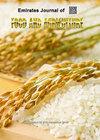Investigating greenhouse gas dispersions and energy consumptive in tea cultivation
IF 0.7
4区 农林科学
Q3 AGRONOMY
引用次数: 0
Abstract
Abstract: The study aimed to uncloak use efficiency of energy and greenhouse gas dispersions in tea cultivation. The study was performed in Rize Province of Türkiye in 2021. In the study, the energy input-output, specific energy, net energy, energy productivity, energy efficiency, types of energy input; greenhouse gas emission, and greenhouse gas emission rates were calculated. A proportional sample survey was used to assess the number of enterprises to be studied for survey and data studies, and face-to-face interviews were held in 2021 with 103 enterprises that could be reached. In the study, energy input was 25686.59 MJha-1, output of energy as 10633.04 MJha-1, efficiency of energy as 0.41, specific energy as 1.93 MJkg-1, productivity of energy as 0.52 kgMJ-1, net energy as -15053.55 MJha-1. 48.72% of all the inputs used in production consisted of human labor energy by 12513.35 MJha-1, 34.40% consisted of the energy of chemical fertilizers by 8835.67 MJha-1, 10.02% consisted of diesel fuel by 2573.37 MJha-1, 4.41% consisted of electricity by 1134 MJha-1, 2.22% consisted of machinery by 570.40 MJha-1 and 0.23% consisted of transportation by 59.81 MJha-1. 63.15% (16220 MJha-1) of the inputs consisted of direct 36.85% (9465.88 MJha-1) and consisted of indirect energy, 48.72% (12513.35 MJha-1) consisted of renewable energy and 51.28% (13173.24 MJha-1) consisted of non-renewable energy. Total greenhouse gas dispersion and greenhouse gas dispersion ratio have been respectively calculated as 551.82 kgCO2-eqha-1 and 0.04 kgCO2-eqkg-1. Keywords: Energy consumption; GHG dispersion; GHG ratio; Tea; Türkiye调查茶叶种植中的温室气体扩散和能源消耗
摘要:该研究旨在揭示茶叶种植过程中的能源利用效率和温室气体排放情况。研究于 2021 年在土耳其里泽省进行。研究计算了能源投入产出、比能量、净能量、能源生产率、能源效率、能源投入类型、温室气体排放量和温室气体排放率。 为进行调查和数据研究,采用了比例抽样调查来评估企业数量,并于 2021 年对 103 家可接触到的企业进行了面对面访谈。研究中,能源投入为 25686.59 兆焦耳-公顷-1,能源产出为 10633.04 兆焦耳-公顷-1,能源效率为 0.41,比能量为 1.93 兆焦耳公斤-1,能源生产率为 0.52 公斤兆焦耳-1,净能量为-15053.55 兆焦耳-1。在所有生产投入中,48.72%(12513.35 兆焦耳-公顷-1)为人力能源,34.40%(8835.67 兆焦耳-公顷-1)为化肥能源,10.02%(2573.37 兆焦耳-公顷-1)为柴油能源,4.41%(1134 兆焦耳-公顷-1)为电力能源,2.22%(570.40 兆焦耳-公顷-1)为机械能源,0.23%(59.81 兆焦耳-公顷-1)为运输能源。63.15%(16220 兆焦耳-公顷-1)的投入由直接能源(9465.88 兆焦耳-公顷-1)和间接能源组成,48.72%(12513.35 兆焦耳-公顷-1)由可再生能源组成,51.28%(13173.24 兆焦耳-公顷-1)由不可再生能源组成。经计算,温室气体总扩散量和温室气体扩散率分别为 551.82 kgCO2-eqha-1 和 0.04 kgCO2-eqkg-1。 关键词能源消耗;温室气体扩散;温室气体比率;茶叶;土耳其
本文章由计算机程序翻译,如有差异,请以英文原文为准。
求助全文
约1分钟内获得全文
求助全文
来源期刊

Emirates Journal of Food and Agriculture
AGRONOMYFOOD SCIENCE & TECHNOLOGY&nb-FOOD SCIENCE & TECHNOLOGY
CiteScore
1.80
自引率
0.00%
发文量
18
期刊介绍:
The "Emirates Journal of Food and Agriculture [EJFA]" is a unique, peer-reviewed Journal of Food and Agriculture publishing basic and applied research articles in the field of agricultural and food sciences by the College of Food and Agriculture, United Arab Emirates University, United Arab Emirates.
 求助内容:
求助内容: 应助结果提醒方式:
应助结果提醒方式:


